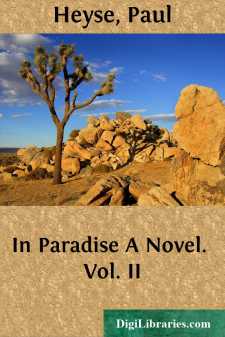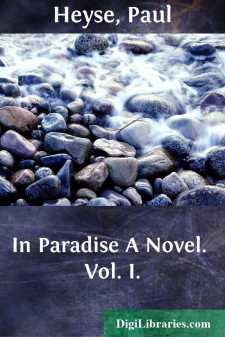Categories
- Antiques & Collectibles 13
- Architecture 36
- Art 48
- Bibles 22
- Biography & Autobiography 813
- Body, Mind & Spirit 142
- Business & Economics 28
- Children's Books 14
- Children's Fiction 11
- Computers 4
- Cooking 94
- Crafts & Hobbies 4
- Drama 346
- Education 46
- Family & Relationships 57
- Fiction 11829
- Games 19
- Gardening 17
- Health & Fitness 34
- History 1377
- House & Home 1
- Humor 147
- Juvenile Fiction 1873
- Juvenile Nonfiction 202
- Language Arts & Disciplines 88
- Law 16
- Literary Collections 686
- Literary Criticism 179
- Mathematics 13
- Medical 41
- Music 40
- Nature 179
- Non-Classifiable 1768
- Performing Arts 7
- Periodicals 1453
- Philosophy 64
- Photography 2
- Poetry 896
- Political Science 203
- Psychology 42
- Reference 154
- Religion 513
- Science 126
- Self-Help 84
- Social Science 81
- Sports & Recreation 34
- Study Aids 3
- Technology & Engineering 59
- Transportation 23
- Travel 463
- True Crime 29
Paul Heyse
Paul Heyse (1830-1914) was a distinguished German writer and translator, renowned for his contributions to literature, including novels, short stories, and dramas. He was awarded the Nobel Prize in Literature in 1910, recognizing his artistic excellence and significant impact on German literature. Heyse was also a key member of the Munich literary society "Die Krokodile," which played a crucial role in shaping the literary landscape of his time.
Author's Books:
Sort by:
by:
Paul Heyse
The day had scarcely dawned.--Over Vesuvius hung one broad grey stripe of mist; stretching across as far as Naples, and darkening all the small towns along the coast. The sea lay calm. But about the marina of the narrow creek, that lies beneath the Sorrento cliffs, fishermen and their wives were at work already, with giant cables drawing their boats to land, and the nets that had been cast the night...
more...
by:
Paul Heyse
In a provincial town of northern Germany there is a street in which the ancient, high-gabled houses bear, inscribed in Gothic letters, upon the lintels of their doors or upon little sandstone tablets, such honorable or fanciful names as "The Good Shepherd," "Noah's Dove," "The Palms of Peace," "The Rose of Sharon," and underneath, the date of their erection. In...
more...
by:
Paul Heyse
CHAPTER I. A mile or two from Starnberg, on the shore of the beautiful lake, stands a plain country-house, whose chief ornament is a shady and rather wild little park of beeches and cedars. This stretches from the highway that connects Starnberg with the castle and fishermen's huts of Possenhofen, down to the lake--a narrow strip of woodland, separated only by picket fences from the neighboring...
more...
by:
Paul Heyse
I had only intended to spend one day up in the mountains, and this one day grew into two weeks, which I found pass more rapidly in that high-perched ruinous nest on the confines of the Albano and Sabine range--the name I will not give--than was often the case in the whirl of great cities. What I actually did with myself during the sweet long days I hardly know how to tell. But in Rome a mighty hunger...
more...
by:
Paul Heyse
CHAPTER I. It was a Sunday in the midsummer of 1869. The air, cleared by a thunderstorm the night before, was still tremulous with that soft, invigorating warmth which, farther south, makes breathing such an easy matter, but which, north of the Alps, seldom outlasts the early morning. And yet the bells, that sounded from the Munich Frauenkirche far across the Theresienwiese, and the field where stands...
more...
by:
Paul Heyse
In June, 1864, a visit I had promised to pay one of the friends of my youth led me into the heart of the province of Brandenburg. I could travel by the railway as far as the little city of St. ----, but from this place was compelled to hire a carriage for two or three miles, as the estate, which my friend had owned several years, did not even possess the advantage of a daily stage. So, on reaching St....
more...
by:
Paul Heyse
CHAPTER I. At the open window, which looked out into the little flower-garden, stood the blind daughter of the village sacristan, refreshing herself in the cool breeze that swept across her hot cheeks; her delicate, half-developed form trembled, her cold little hands lay folded in each other upon the window-sill. The sun had already set, and the night-flowers were beginning to scent the air. Further...
more...
by:
Paul Heyse
CHAPTER I. A few years ago, in the Dorotheen-strasse, in the midst of the Latin Quarter of Berlin, whose quiet, student-like appearance threatens to become effaced by the growing elegance of the capital, a small, narrow, unpretending two-story house, stood humbly, as if intimidated, between its broad-shouldered neighbors, though every year it received a washing of a delicate pink hue, and recently had...
more...









